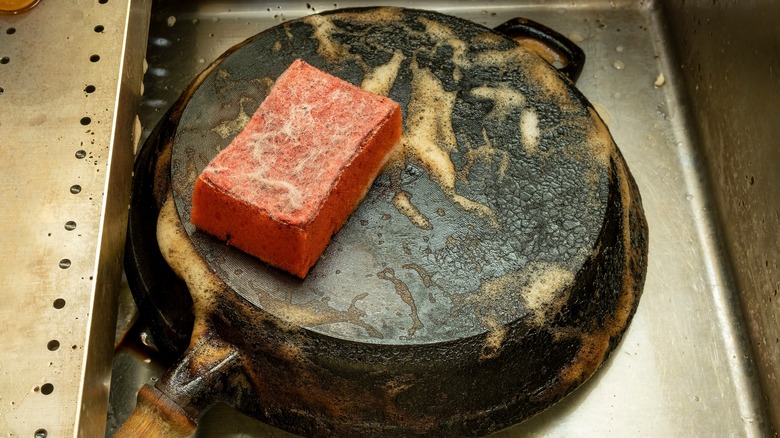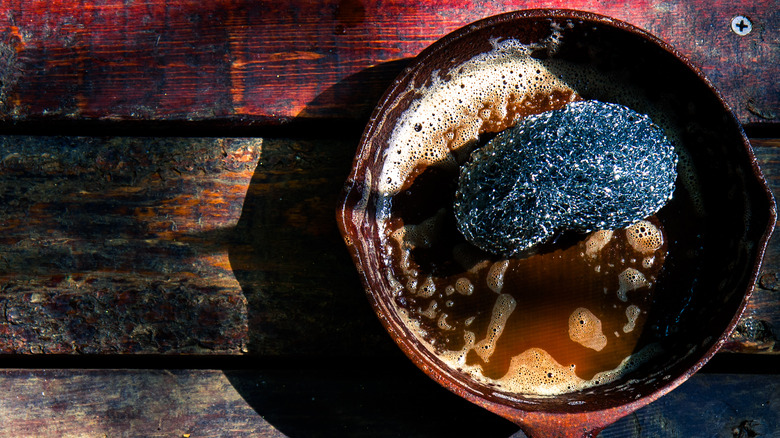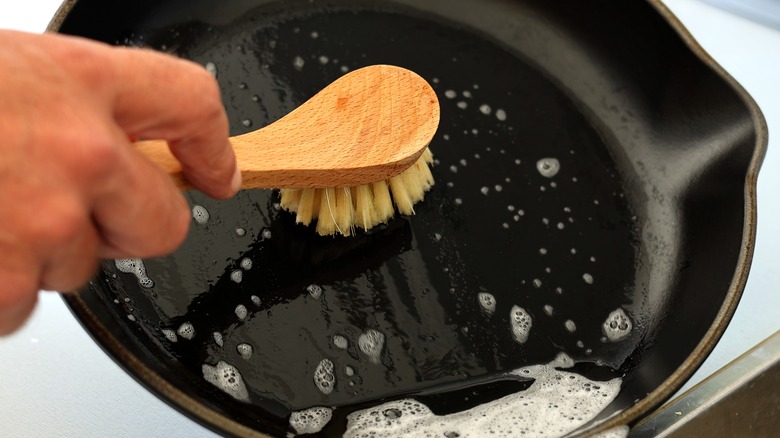Why It's So Important To Keep Your Cast Iron Clean
Few pieces of kitchen equipment are as immediately recognizable as the cast iron skillet. A lot of you might associate this weighty tool with cartoons, where it was often wielded as an impromptu weapon by harried homemakers. But the cast iron skillet's usefulness goes far beyond defending against home invaders — just glance through this list of 24 hearty dinners, which features such disparate dishes as mac and cheese, cookie cakes, and roast chicken, if you want a sense of the implement's versatility.
Cast iron is able to withstand a lifetime of wear, and its naturally nonstick surface is perfect for cooking up dinner without losing part of your meal to unwanted adhesion, which is why you should invest in a good cast-iron pan. However, if improperly cared for, your cast iron kitchenware can transform from a handy tool to a hunk of junk. Keeping your cast iron clean is essential. Fortunately, it can be accomplished rather easily.
What is cast iron seasoning?
Seasoning, when talking about cast iron, doesn't reference herbs and spices. Rather, seasoning is what makes your cast iron skillet nonstick, per Food Network. Essentially, the seasoning process involves applying a thin layer of oil to the pan and introducing it to heat, which causes the oil to bond with the pan. Nowadays, most cast iron implements are sold with a protective layer, but you can also season your own skillet — simply coat the pan with a small amount of oil and heat it up.
Seasoning is not permanent. According to Lodge Cast Iron, when your pan's protective layer begins to break down, it may begin to rust. Additionally, there may come a point where it's necessary for you to scrape off some of the seasoning yourself, as carbon buildup from bits of burnt food adheres to your pan, making the coating uneven and interfering with the cooking process, per SFGate.
Things to keep in mind when cleaning your cast iron tools
There are several fatal mistakes you need to avoid when caring for your cast iron tools. First and foremost, you should avoid immediately introducing a hot cast iron skillet to cold water. Doing this can cause thermal shock, or an accelerated contraction of the metal, which could potentially result in your skillet warping, or even cracking.
Cold shock isn't the only pitfall associated with proper cast iron maintenance. According to Southern Living, contrary to popular belief, you can use soap when cleaning cast iron. The notion that you cannot came about at a time when soap was made of harsher materials. With a moderate amount of mild dish soap, some warm water, and a soft scrubber that won't scratch the seasoning, you can keep your cast iron pan clean as a whistle. If getting your skillet sudsy still makes you uncomfortable, you can opt to use only the water and scrubber, as the heat introduced during reseasoning will kill off any bacteria.
You don't want to stick your dirty cast iron pan in the dishwasher, or leave it to soak in dishwater — both actions could cause your pan to rust, per The New York Times. Additionally, when the bits of carbon buildup on your cast iron pan are beginning to get a bit excessive, you can sprinkle a bit of salt in a still warm pan. Salt is abrasive when scrubbed, and it can help dislodge the buildup.


